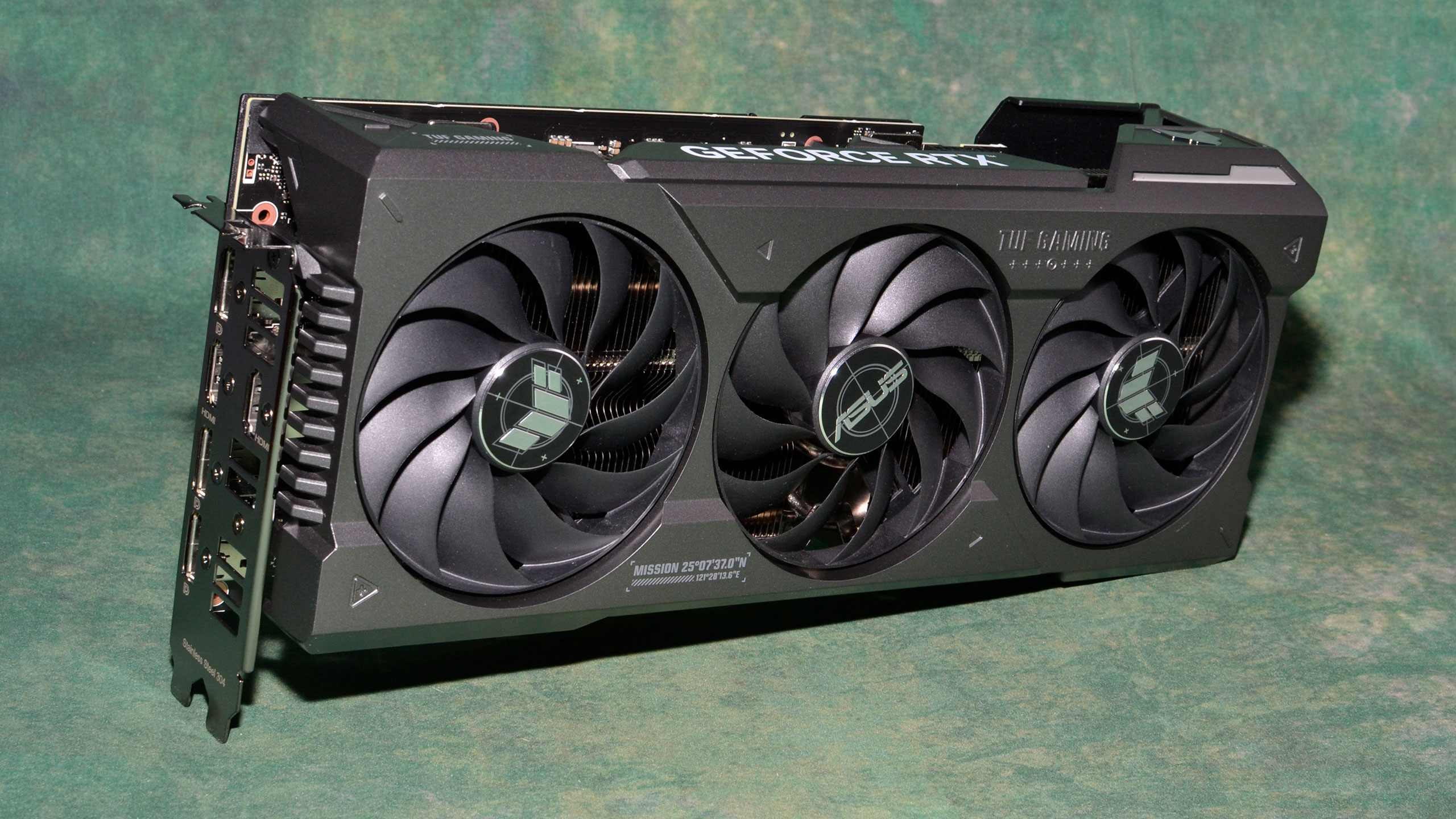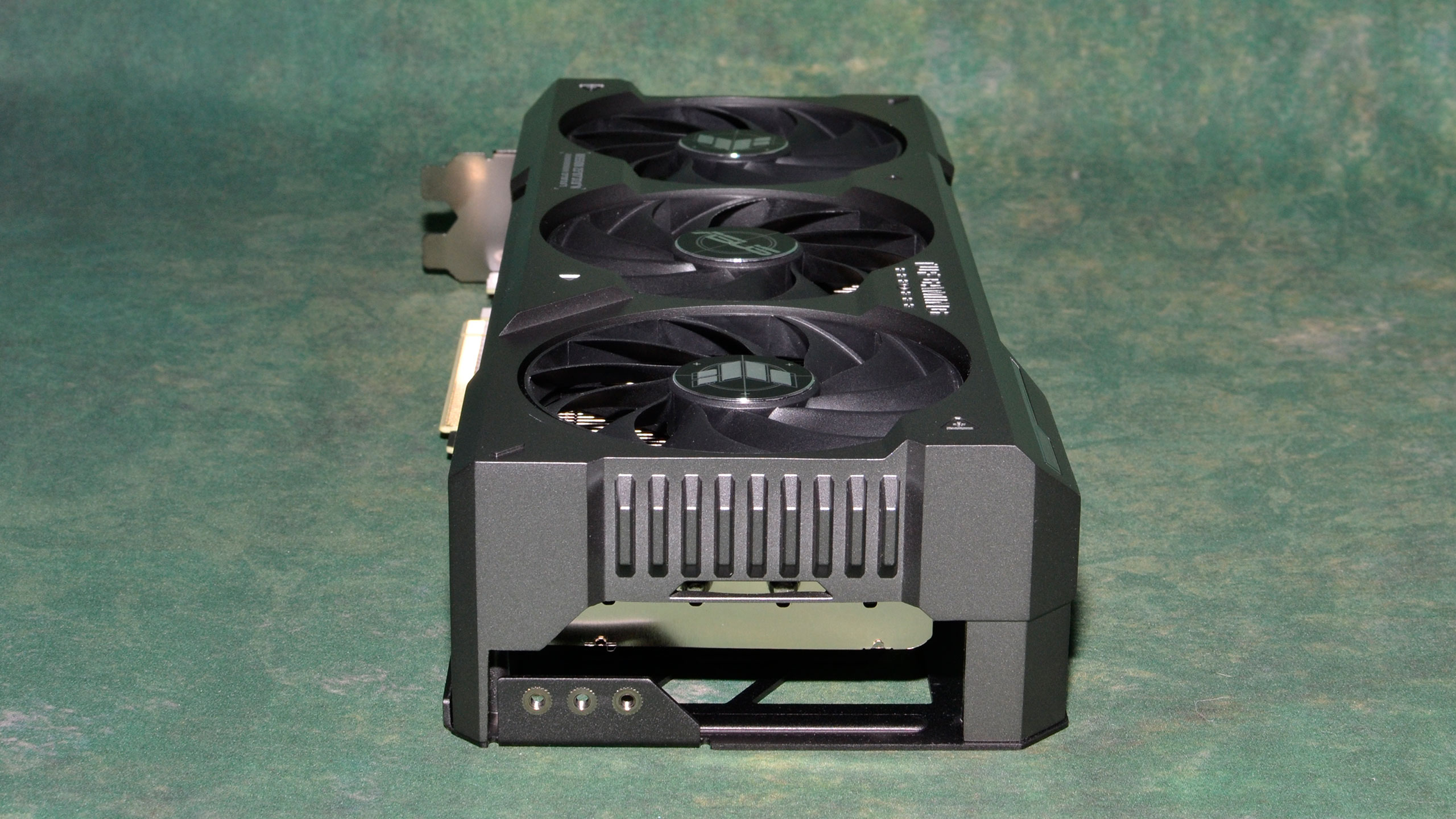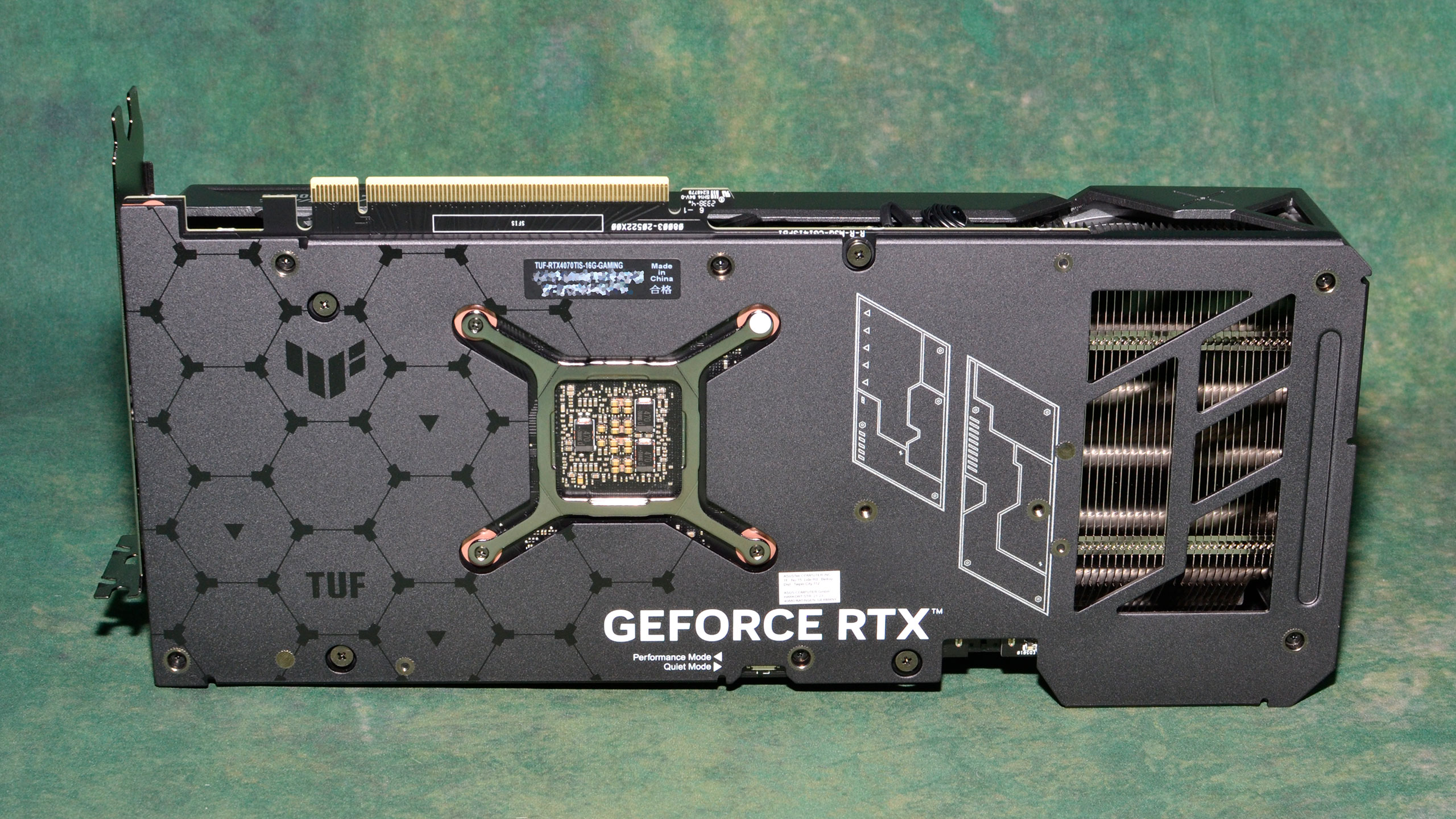Why you can trust Tom's Hardware
Nvidia's RTX 4070 Ti Super, in the form of the Asus TUF Gaming reference clocked card, provides plenty of weight to arguments from Nvidia that modern graphics cards don't necessarily need 16GB of memory and a 256-bit interface to perform well. There are certainly cases where the extra memory helps, but they're relatively rare.
Across our standard 15-game test suite, the biggest performance advantage we saw compared to the 4070 Ti 12GB card was only 15%. Even 1% lows weren't ever more than 15% higher than the 4070 Ti Super's predecessor. But we did find at least one example in our bonus gaming tests where the added memory and bandwidth helped more: Alan Wake 2, with full path tracing, running at 4K using DLSS Quality upscaling, ran 23% faster, on both average and 1% low fps results.
That doesn't mean other games, particularly future games, might not want more than 12GB of VRAM. Plus, if you're spending $800 on a graphics card, it's really difficult to justify not having at least 16GB of memory these days. The vanilla 4070 Ti may perform well enough in general, but it always felt overpriced and underspec'd relative to other GPUs.
As we've said before, we would have preferred an additional 4GB of VRAM (and a 64-bit wider interface) on nearly every RTX 40-series GPU. The RTX 4070 Ti Super basically gives us exactly that by opting for the AD103 chip rather than the AD104. By using a relatively cut-down chip with only 83% of the cores enabled, there's still a decent gap between the 4070 Ti Super and the 4080 — and soon its 4080 Super replacement — which also gives Nvidia something to do with chips that couldn't meet the 76 SMs requirement of the 4080.
Nvidia's still making a sizeable profit on these cards, though. With a die size of 379mm^2, Nvidia should get around 150 potential chips per 300mm wafer from TSMC. Even at a price of $20,000 per wafer — which is almost certainly far more than what Nvidia is paying (we've seen estimates of more like $14~$15 thousand) — that would still only be $133 per chip in pure silicon costs. Call it another $200 or so for the PCB, cooling, and other components, and that's still less than half of the MSRP.
This isn't a generously priced graphics card, in other words, and by raising the MSRP, Nvidia probably took a more sizeable cut from its AIB partners. Still, it's certainly better than paying the same $800 for the RTX 4070 Ti — which is probably why the base price on those cards has fallen to around $740, and we've seen sales push the price as low as $720, which is still arguably too high.
Is the RTX 4070 Ti Super worth the asking price? That depends on what you want to do with it. Relative to AMD's RX 7900 XT, even at its current promotional pricing starting at $709, you can certainly make arguments in favor of Nvidia's GPU. It's more power efficient, is potentially better equipped for future games (if ray tracing adoption picks up), offers access to Nvidia's proprietary DLSS features, including frame generation, and you get superior AI performance.
If all you care about is rasterization performance, AMD's 7900 XT comes out ahead and offers a better value. And there are hundreds of new rasterization-only games released every year. But if you value any of those other 'extras' — even if you only think you might want to try them — Nvidia has cards at every price point that are worth a look.
Ultimately, the RTX 4070 Ti Super provides some worthwhile improvements over its non-Super predecessor. If you're in the market for a high-end Nvidia GPU and you haven't upgraded in a few years, it's a great card. Just don't be surprised when next-generation GPUs come out in a year or so that have even more new features, improved performance, and just maybe not a massive generational price increase. (We can dream about that last one, right?)
- MORE: Best Graphics Cards
- MORE: GPU Benchmarks and Hierarchy
- MORE: All Graphics Content
Get Tom's Hardware's best news and in-depth reviews, straight to your inbox.
Current page: Nvidia RTX 4070 Ti Super: A decent mid-cycle update
Prev Page Nvidia RTX 4070 Ti Super: Power, Clocks, Temps, and Noise
Jarred Walton is a senior editor at Tom's Hardware focusing on everything GPU. He has been working as a tech journalist since 2004, writing for AnandTech, Maximum PC, and PC Gamer. From the first S3 Virge '3D decelerators' to today's GPUs, Jarred keeps up with all the latest graphics trends and is the one to ask about game performance.
-
Loadedaxe As always, very thorough review. I wish these insane prices would come down to normal levels.Reply
If no one had credit cards, they would not be selling well at all. I am still going to hold out until the offerings from both AMDs and Nvidias next gen arrives. -
AgentBirdnest Wow, that's... disappointing, honestly. Like Jarred mentioned, I too was expecting it to be closer to the 4080. At the very least, I thought it would consistently outperform the 7900XT at 1440p.Reply
I had my eye on this card to finally replace my RTX 2060, but after seeing these benchmarks, I'm not so sure.
Part of me wants to have the better memory specs, in case games coming over the next few years will benefit more from it (Alan Wake seems to show that.) And I may upgrade from 1440p to 4K, but not for at least a year. But futureproofing is hard, since I don't own a crystal ball.
The other part of me thinks the 4070 Super is close enough in performance, and I could use the saved $200 to buy a 4TB SSD that I could make use of. But I don't wanna regret my decision in 2 years.But with either choice, I'm sure I'll be absolutely ecstatic when I upgrade from my 2060. : P
In any case - awesome review, Jarred! You do great work. : ) -
Colif Nvidia repeating what they did with 2070 Super.Reply
4070 TI Super is mostly a 4080
2070 Super was mostly a 2080
Guess old play book worked back then.
8U_S8vrRs-Y -
DavidLejdar Thanks for the detailed review! I don't care much for ray-tracing. So, if I'd upgrade towards 4K, it looks like the RX 7900 XT would be a better option for me - as it is a bit cheaper and with a bit more rasterization performance.Reply
It sure ain't cheap. In my case, I easily miss out on some other stuff though. I.e., it hasn't been until 2023 that I got me a smartphone (and then only a cheap one) - meanwhile at home, a rig with DDR5 RAM already, which should last some years.Loadedaxe said:As always, very thorough review. I wish these insane prices would come down to normal levels.
If no one had credit cards, they would not be selling well at all. I am still going to hold out until the offerings from both AMDs and Nvidias next gen arrives.
Also, here in Germany, we have universal health-care and federal minimum wage of 12.42 Euro. So even with locally low salary (full-time), and after payslip-deductions (such as for that mandatory health-care insurance), and with not too high a rent (as not every owner here needs money for a golf course), it is possible to save up a bit for a rig (without worry of needing a fortune for medical expenses).
And some accountancy helps too. Like, when someone spends i.e. $2 a day on fizzy drinks, drinking water instead means a saving of nearly $60 a month, or $720 a year. Smoking? Smoke some less. And voila, $800 for a GPU, while having improved health.
Not saying that I will get me a new GPU soon, and no reason to overspend of course. And if I'd be living in the countryside, to begin with, I'd would likely need a car and pay insurance for it, even if driving only a few miles every day on empty roads. Etc. But if one can put aside some $40 a month (without interest rate), not that tough to have a modern rig. -
cknobman AMD will likely need to lower the MSRP of the 7900 cards.Reply
Smart move would be to match the 7900XTX msrp to the new 4070ti Super. -
Devoteicon Reply
They are normal.Loadedaxe said:I wish these insane prices would come down to normal levels. -
Eximo All I can say is, go Intel? Need a disruption in the upper mid-range for sure. Even if it is 4070 Super / 7800XT levels of performance that would kick off some re-pricing.Reply -
FoxtrotMichael-1 Reply
I'm not sure what else you spend your money on but inflation has affected every aspect of the economy. Just about everything I buy for a family of 5 is twice as expensive as it was a decade ago.Loadedaxe said:I wish these insane prices would come down to normal levels. -
Gururu Reply
100% agree and watching for itEximo said:All I can say is, go Intel? Need a disruption in the upper mid-range for sure. Even if it is 4070 Super / 7800XT levels of performance that would kick off some re-pricing. -
edzieba ReplyThere's surprisingly little uplift in most games from the memory upgrades
No surprise at all: the 4xxx (and 3xxxs) series have not been memory capacity limited in any of the cards released thus far. Even the 4060Ti 8/16gb only started to see serious performance disparities when settings were cranked far enough for the performance choice to be between "not very good" and "still not very good", so 12GB/16GB is going to offer naff-all in real world testing.
Remember: buy cards based on actual benchmarking (ideally of the games you play), not based on numbers on the box.


